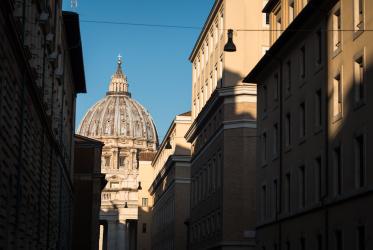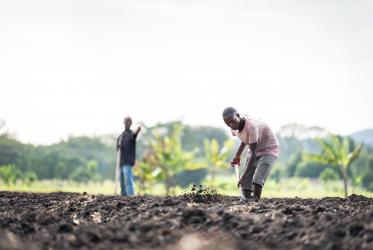Rev. Dr Samuel Kobia
WCC general secretary
Presentation at the event marking the 40th anniversary of the Joint Working Group
between the Roman Catholic Church and the WCC
Your Holiness Aram I, Your Eminence Cardinal Kasper, Your Excellencies, Your Graces, dear brothers and sisters in Christ,
It is my sincere pleasure to welcome to you to the World Council of Churches on this important and auspicious occasion. Together we will celebrate the 40th Anniversary of the Joint Working Group between the World Council of Churches and the Catholic Church. We will review and evaluate our activities, and our relationship over these years, and at the present time; and we will look to the future of our working and witnessing together.
Today is a day for recalling memories, for thanksgiving and rejoicing - and a day for posing questions, to ourselves and to each other, about where we have been and where we are going together.
The relationship between the World Council of Churches and the Catholic Church has a long and interesting history. Four observers from the Catholic Church were sent to the WCC's 3rd Assembly in New Delhi in 1961, and an observer delegation was also present at the Conference on World Mission and Evangelism in Mexico City in 1963. At the World Conference on Faith and Order in Montreal in 1963, the distinguished Roman Catholic biblical scholar Raymond Brown presented one of the biblical keynote papers, entering into a lively exchange with his prominent Protestant counterpart, Ernst Käsemann.
As is well known, the World Council of Churches was invited to send four observers to the Second Vatican Council, and in response the Officers of the WCC appointed Dr. Lukas Vischer and Dr. Nikos Nissiotis, as well as two part-time observers, Bishop John Sadiq and Professor Masatoshi Doi. From this group we are pleased to have Lukas Vischer among us today.
It is said that the notion of a "Joint Working Group" as a consultative forum between the WCC and the Catholic Church came originally from a meeting held in Milan in 1961 between Rev. Dr. Wilhelm Visser t Hooft and Cardinal Bea. In a broader sense, it was the fruit of two profound movements spurred, I believe, by the Holy Spirit: one was the Second Vatican Council of the Roman Catholic Church; the other was the increasing readiness of the Protestant and Orthodox churches within the World Council of Churches for dialogue with their Catholic counterpart. Behind both movements was a growing awareness that ecumenism is not an option or "extra", but something which is intrinsic to the church - and therefore at the heart of the lives of each of the churches.
In May 1965, then, the first Working Group met under the leadership of the two comoderators Dr. W.A. Visser t Hooft and the Secretary of the Secretariat to Promote Christian Unity, Bishop Johannes Willebrands. We may say that one of its immediate gifts to the churches was the materials for the Week of Prayer for Christian Unity, produced jointly since 1965. It is, I think, highly significant that a "first fruit" of the Joint Working Group was this enduring example of "spiritual ecumenism", done in the service of that prayer for unity which must undergird all our ecumenical hopes and programmes.
The Joint Working Group was created as an instrument to further the search for Christian unity and the churches' common witness and service. It represents a distinct and important model of relationship whereby the representatives of the two bodies - the Catholic Church, through the Pontifical Council for Promoting Christian Unity, and the World Council of Churches - despite different self-understandings meet in equal numbers and on an equal basis. The mandate of each Joint Working Group lasts from one WCC Assembly to the next; at the end of each mandate an official report is presented to the two parent bodies for their consideration and follow-up. The current members of the Joint Working Group have completed the Eighth Report, which will be presented to our 9th Assembly in February 2006, in Porto Alegre, Brazil.
The Joint Working Group started as an experiment - a hopeful, indeed daring, effort to bring together two bodies which were quite different, but had a common commitment to the search for unity and to the churches' common witness and service. The Joint Working Group quickly took on a life of its own and has been characterized by a lively and healthy conversation, and a desire to produce practical results. Inevitably our journey together has not always been a smooth one; we have had some difficulties, but we have tried to learn also from these, and consequently they have not damaged the basic health of our relationship. We have also been open to the "signs of the times", trying to respond together to the challenges posed by the changing situations of the churches around the world, and by developments within the ecumenical movement. Through the Joint Working Group, the WCC and the Catholic Church have indeed grown in their relationship over the years.
Based on, and encouraged by, this solid foundation many expressions of the fellowship between the WCC and the Catholic Church have developed over the years. Since just after the Second Vatican Council the Roman Catholic Church has participated fully in the work of the Faith and Order Commission, offering valuable leadership and making invaluable contributions to its studies. The Week of Prayer has advanced in 2004 from joint production of the materials, to full joint publication. Representatives of the Catholic Church are members of the Commissions on World Mission and Evangelism and Ecumenical and Formation. A Catholic serves as consultant and links the mission and evangelism work of the WCC especially to missionary congregations in the Roman Catholic Church. A full-time professor is seconded to the Ecumenical Institute Bossey as one of its core teaching staff. Other WCC programmes, for example those on inter-religious dialogue, justice and peace, and health and healing, are in regular and fruitful contact with their counterparts in the Vatican. We express our thanks for all the cooperation on these and other issues with various dicasteries of the Vatican, as well as our contacts with local and international lay movements.
In reviewing the breadth and depth of our contacts with the Catholic Church, I want to pay tribute especially to the Pontifical Council for Promoting Christian Unity. Your Eminence Cardinal Kasper, the Pontifical Council has been both an animator and a co-ordinator of the bulk of our official contacts with the Catholic Church. You and your colleagues have performed this role faithfully and creatively over the years, so that we have found in you a trusted partner on our common ecumenical journey. For your role in the life of the Joint Working Group, and in our wider contacts with the Catholic Church, we are indeed grateful.
In conclusion I would like to turn from the past and present, and look for a moment towards the future. It is no accident that we gather today under the theme "Towards the Renewal of Ecumenism in the 21st Century: The Contribution of the Joint Working Group". For we recognize that our own work belongs within a wider context: within the lives of the churches and within the ecumenical movement as a whole. For the WCC and its member churches, these are times of renewed reflection on the ecumenical movement and how it can best serve the unity, and common witness and service, of the churches.
We have more to learn and to discern in this process, but I would like to highlight one thing which has become clear from our experience and reflection. This is the churches' growing awareness that the fellowship which they share within the WCC, and in the wider ecumenical movement, has concrete implications - not only for the way in which the churches relate to each other, but also for how each church conducts it own life. We realize increasingly that what each church says and does affects its ecumenical partners, in ways which were unthinkable only 20 years ago. We are more and more linked by bonds of common experience, reflection, worship, mission, service and commitment. We recognize increasingly that, just as no part of the body can say "I have no need of you" (I Corinthians 12:21), the churches cannot say to each other: "I have no need of you". The fact is, they need each another in order for each of them to be fully what Christ intends them to be. We need ecumenical institutions and structures which can respond to this situation, helping the churches to express more fully the unity which is theirs in Christ.
This makes it all the more important that, even as we reflect on new forms and approaches for the ecumenical movement of the future, we reaffirm our fundamental commitment to the goals of Christian unity, and common witness and service, which have guided us so far; and that we continue in prayer and the life of the Spirit as the basis for all our ecumenical work.
In June 2005, I visited His Holiness Pope Benedict XVIth with a delegation of members of the governing bodies and staff of the World Council of Churches. On that occasion the Holy Father reaffirmed his commitment to Christian unity and to ecumenism. During my private conversation with His Holiness, he expressed his agreement with my observations regarding the shift of Christianity from the North to the South; I shared in addition my concern about the need for renewed expressions of Christian spirituality to respond to the needs of youth today. For his part, the Holy Father expressed his concern about the process of secularization and the weakening of Christian spirituality in Europe. We also discussed the new and developing situation in interfaith relations. Thus in addition to affirming the fundamental bonds between us, we also noted some of the phenomena which will influence the content and method of our future work together.
In view of all these considerations I am bold to say that our gathering today is not only appropriate and timely; it is necessary. In a changing and uncertain world, in face of the challenges confronting Christians and the churches today, we need to reaffirm our commitment to our common journey towards Christian unity, and common witness and service. We need to renew and reaffirm our ecumenical vision, in language which is convincing and compelling for the churches - and for Christians! - in the 21st century. And we need to shape a mandate for the Joint Working Group, one which can free and empower it to play its essential role in the ecumenical movement in the years to come.
And now His Holiness Aram I, Catholicos of Cilicia and Moderator of the Central Committee of the World Council of Churches, and Cardinal Walter Kasper, President of the Pontifical Council for Promoting Christian Unity, will begin our process of reflection and discernment.
As I welcome you in this Ecumenical Centre - as we begin our celebration of the past and present, and our envisioning of the future - I pray that the Triune God will guide us in our journey together.




